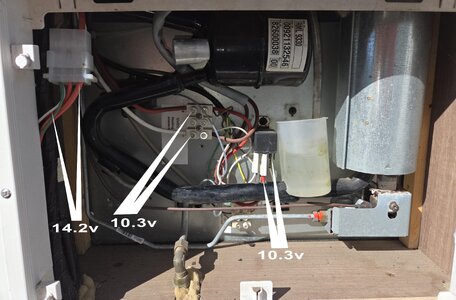Having disconnected the wires to the element I have measured a resistance of 0.80 ohms
Having given a bit more though to this issue, I am concerned at the elements 0.80 Ohms result. Unless you zeroed out the test lead resistance, or used four terminal measurement we need to consider that most multimeter test leads typically add about 0.1Ohm per lead to the measurement.
With a meter that can resolve to 0.01Ohms if you select the Ohms measurement and touch the tips of the leads I would expect you to see up to 0.2 (200milliOhms) resistance shown on the meter That represents 25% of the reading you made.
This revises the actual element resistance and could be as low as 0.6 Ohms.
Applying the basic electrical calculations shows that given a 12V dc supply the 0.6 Ohm element would draw (12V /0.6Ohm) = 20A! That would represent a power consumption of (12V x 20A) = 240W which is almost twice the typical 12V consumption. This seems unusual and questions the integrity of the element. - some of its coils might be shorting.
You tell us in your opening post you have measured 14.4V at Pin 10. I have to assume that was with the caravan disconnected to give you access to the pin 10. Importantly there would be no current flow through the circuit as the caravan was disconnected. This also means there would no current related voltage drop through the cars wiring.
You go on to tell us that you have measured the voltage on the fridges wired connection at a relay, and you measure only 10.3V. I have to assume you have reconnected the caravan to the tow vehicle with its engin e running, so what this means is that somewhere between pin 10 of the cars socket and the relay output there is a voltage drop of 14.4 -10.3 = 4.1V. This is far more than is reasonable to expect, especially if as you tell us the fridge does not work when powered by the 12V circuit, the implication that it is not using any "12V "power.
A 4.1V drop suggests that current is flowing and is interacting with the wire resistance, or other resistances in the circuit, but as the fridge circuit should be isolated enough current to cause a 4.1V drop is something major.
If my assumption describe above about the resistance of the fridges element is correct, it suggests an excessively high current could have been flowing in the circuit. If this was passing through a relay that was not rated to carry such a large current, the relays contacts could have been damaged and now present a high resistance (relatively speaking) contact. This now prevent s enough current reaching the fridge element.
You need to confirm the fridge elements condition, and that may require a approved fitter. You should also have the "relay" checked to see if tis functioning correctly.
Good luck



